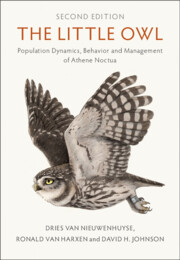Book contents
- The Little Owl
- The Little Owl
- Copyright page
- Contents
- Foreword
- Preface
- Acknowledgements
- Executive Summary
- Chapter 1 Introduction: Framework
- Chapter 2 History and Traditions
- Chapter 3 Fossil Evidence, Taxonomy and Genetics
- Chapter 4 Morphology and Body Characteristics
- Chapter 5 Distribution, Population Estimates and Trends
- Chapter 6 Habitat
- Chapter 7 Diet
- Chapter 8 Breeding Season
- Chapter 9 Behavior
- Chapter 10 Population Regulation
- Chapter 11 Management and Conservation
- Chapter 12 Research Priorities
- References
- Index
Chapter 12 - Research Priorities
Published online by Cambridge University Press: 29 September 2023
- The Little Owl
- The Little Owl
- Copyright page
- Contents
- Foreword
- Preface
- Acknowledgements
- Executive Summary
- Chapter 1 Introduction: Framework
- Chapter 2 History and Traditions
- Chapter 3 Fossil Evidence, Taxonomy and Genetics
- Chapter 4 Morphology and Body Characteristics
- Chapter 5 Distribution, Population Estimates and Trends
- Chapter 6 Habitat
- Chapter 7 Diet
- Chapter 8 Breeding Season
- Chapter 9 Behavior
- Chapter 10 Population Regulation
- Chapter 11 Management and Conservation
- Chapter 12 Research Priorities
- References
- Index
Summary
This chapter deals with research priorities that were obtained during the writing of this book. We first illustrate the recent insights that were published since the publication of the first volume. New research topics deal with further exploring and identifying critical habitat components and the effect of land improvement initiatives. Demographics need to be studied in less covered areas using methods that have been perfectioned in the typical highly researched countries. Examining responses of Little Owl populations to land uses and the effects of abiotic environmental factors should allow for more quantitative management and follow-up on the effectiveness of taken measures. The adoption of the information-theoretic approach, focus on process variation and searching for mechanisms will need more statistical background and thoroughness, leading to even more long-term observational studies and focus on the cumulative effects. To do this in an optimal way, more experiments are urgently needed, to enable controling for certain parameters. Finally there is a need for the expansion of the investigated geographic range and an increase in research and experiment maturity in emerging countries, hopefully enabled by highly mature research teams and international co-operation.
Keywords
- Type
- Chapter
- Information
- The Little OwlPopulation Dynamics, Behavior and Management of <I>Athene noctua</I>, pp. 553 - 562Publisher: Cambridge University PressPrint publication year: 2023



